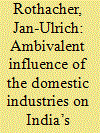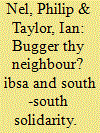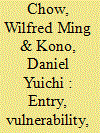| Srl | Item |
| 1 |
ID:
143935


|
|
|
|
|
| Summary/Abstract |
Most of the Indian government’s bi- and multilateral trade initiatives are stuck in political deadlock. At the same time, the unilateral measures are lurching between trade restricting and liberalizing policies. By conducting detailed investigations into the process of the trade policy formulation in three industries, this article seeks to discern the societal pressures that are driving the government’s trade preferences and policies. The empirical results show that the government’s tortuous dealings can be explained by two impulses of the domestic industries that have been emanated by the opening of the economy in the 1990s. Most of the domestic industries—grappling with competition from abroad—will call for some form of protection from the global markets. These compulsions, however, endanger the benefits that other domestic industries derive from the global markets—through the access to intermediate goods, foreign investments or export opportunities. This is why they will militate against protectionist interventions. The outcome is an overall consolidation of the open trade regime, which is, however, frequently upset by spats between different domestic industries over the formulation of trade policies.
|
|
|
|
|
|
|
|
|
|
|
|
|
|
|
|
| 2 |
ID:
123538


|
|
|
|
|
| Publication |
2013.
|
| Summary/Abstract |
South-South cooperation is assumed to reflect a deep attitude of solidarity among nations of the global South. We point out that, although India, Brazil and South Africa (ibsa) present themselves as being in the vanguard of South-South cooperation, their foreign economic policies make such solidarity somewhat thin. We focus on examples in which these three states deliberately but also unintentionally create sub-optimal conditions for the development of some of their Southern neighbours. This outcome reflects the policies that emerging centres of accumulation in the South are promoting, as well as the material interests of the dominant class alliances in the aforementioned states. There is a need for close scrutiny of the foreign economic policies of dynamic developing economies, and for closer multilateral coordination among the states of the global South.
|
|
|
|
|
|
|
|
|
|
|
|
|
|
|
|
| 3 |
ID:
157552


|
|
|
|
|
| Summary/Abstract |
Why are some autocracies more open to trade than others? And why are autocratic trade policies so volatile? Despite wide variation in how autocracies approach international trade, existing research offers few answers to these questions. We argue that the trade policies of autocratic regimes depend in part on the mode of entry of their leaders. Autocrats can enter power either legally—according to established rules of succession—or extralegally, through a palace revolt or coup. These different modes of entry lead to different posttransition politics and trade policies. Because new extralegal leaders are outsiders with limited resources, they are vulnerable to coups by other ruling elites. They reduce this vulnerability by building public support via lower tariffs. However, as they consolidate their rule, they reverse these initial tariff cuts. Extralegal entries thus lead to foreign economic policies that are more “cooperative” in the short run but more volatile in the long run.
|
|
|
|
|
|
|
|
|
|
|
|
|
|
|
|